April 7, 8:30 am - 11:30 am
Join us for our first case study that considers how clinical guidelines and decision making are impacted by patients’ race, and how this has implications for equity.
Agenda
| 8:30-8:40 am |
Opening Remarks |
| 8:40-9:15 am |
Case Study 1 Flash Talks |
| 9:15-9:40 am | Moderated Discussion with Flash Talk Speakers |
| 9:40-9:50 am | Break |
| 9:50-10:00 am |
Comments |
| 10:00-11:00 am |
Moderated Discussion with Responder Panelists |
| 11:10-11:30 am | Closing Comments Eliseo Perez-Stable, MD |
Flash Talk Speakers

Michelle Albert, MD, MPH
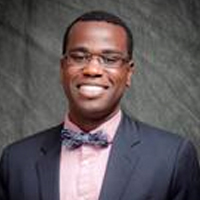
Valy Fontil, MD, MAS, MPH
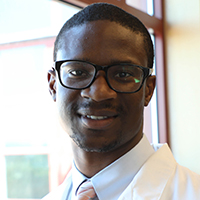
Akinyemi Oni-Orisan, PharmD, PhD
Michelle Albert, MD, MPH
Professor of Medicine
Director, CeNter for the StUdy of AdveRsiTy and CardiovascUlaR DiseasE (NURTURE Center)
Associate Dean of Admissions, UCSF School of Medicine
Dr. Michelle A. Albert, MD MPH is a Professor in Medicine at the University of California at San Francisco (UCSF), Admissions Dean for UCSF Medical School and Director of the CeNter for the StUdy of AdveRsiTy and CardiovascUlaR DiseasE (NURTURE Center). Dr. Albert is a graduate of Haverford College, the University of Rochester School of Medicine and Harvard School of Public Health. She completed Internal Medicine Residency and was a Chief Medical Resident at Columbia University Medical Center in New York. Dr. Albert then completed Cardiovascular Clinical and Research Fellowship at the Brigham and Women’s Hospital and Harvard Medical School, where she rose in the ranks to an Associate Professor in Medicine. She was previously the Vivian Beaumont Allen Endowed Professor/Chair and Chief of Cardiology at Howard University.
Dr. Albert maintains an active clinical practice. Her clinical expertise involves both taking care of the most critically ill heart disease patients and preventive cardiology at UCSF. As a physician-scientist-epidemiologist, Dr. Albert is engaged in cutting-edge research that innovatively seeks to incorporate “biology” with social determinants of health to transform CVD science and healthcare of global populations, i.e. “the biology of adversity”. Her research has followed a bold, non-traditional path for cardiovascular disease research. A central component of her current work focuses on developing innovative implementation strategies to curb adversity related CVD risk, particularly in women and racial/ethnic minorities with a focus on health disparities and cumulative toxic stress. She is recipient of multiple research awards including NIH R01 funding, as well as funding from RWJ (Harold Amos Scholar), Kellogg and Doris Duke Foundations. Dr. Albert is a recipient of the American Heart Association (AHA) COVID-19 Rapid Track Grant. Additionally, she is one of two recipients nationally of the prestigious 2018 AHA Merit award for visionary research and is the first woman and under-represented minority person to receive this award. Recently, Dr. Albert also received the distinguished 2020 AHA Population Science Award.
Dr. Albert is currently the 60th President of the Association of University Cardiologists, one of few women to serve in this capacity and the first African-American female in this role. She is also an elected member of the American Society of Clinical Investigation (ASCI). She is an Associate Editor at Atherosclerosis, Thrombosis & Vascular Biology (ATVB), serves on the Editorial Board of Circulation, where she serves as a Section Editor for their Disparities issue; she is also a Section Editor for Current Cardiovascular Risk Reports.
Valy Fontil, MD, MAS, MPH
Assistant Professor, Medicine, UCSF
Valy Fontil, MD, MAS is an Assistant Professor of Medicine at the UCSF Division of General Internal Medicine-SFGH and the UCSF Center for Vulnerable Populations. Dr. Fontil is committed to using multiple research methodologies to study proactive clinical approaches for disease prevention and cardiovascular risk reduction in disenfranchised populations vulnerable to health disparities. As a health services researcher and implementation scientist, his current work is focused on identifying, studying, and implementing hypertension management interventions to improve population health and reduce health disparities. Some of his most recent research work has included: (1) analysis of national datasets to identify gaps and disparities in current management of hypertension; (2) development and use of microsimulation modeling to predict what clinical interventions might work best for improving hypertension control; and (3) implementation of a practice-based hypertension in safety-net clinics. He was recently awarded a UCSF institutional grant to help fund his efforts in adopting and implementing Kaiser Permanente’s hypertension control program in the San Francisco General Hospital’s General Medicine Clinic – Bring it Down GMC. Dr. Fontil also has in interest in leveraging mobile health information technology for practice-based interventions in healthcare safety-net institutions.
Dr. Fontil studied at Oakwood College, a historically Black College, and then went on to medical school at the University of Michigan, where he received his MD and MPH. He then joined the UCSF family to do his General Internal Medicine Research Fellowship, where he earned a Master of Advanced Studies in Clinical Research with a specialization in implementation science. He has worked with Drs. Bibbins-Domingo and Mark Pletcher to develop the Blood Pressure Control Model, a computer microsimulation model that simulates the healthcare processes involved in controlling blood pressure. As a UCSF postdoctoral scholar, Dr. Fontil developed a hypertension treatment algorithm that is now being implemented in several clinics across the San Francisco Health Network.
In addition to his research, Dr. Fontil serves on the selection committee for the Pre-Health Undergraduate Program at the UCSF Clinical and Translational Science Institute (CTSI) and a lecturer in the program’s Designing Clinical Research curriculum. He is also an affiliated mentor and presenter in the UCSF-RISE program – a recently funded NHLBI R25 grant for a summer institute to attract under-represented minority faculty from other institutions to UCSF for an implementation science curriculum and mentoring.
Akinyemi Oni-Orisan, PharmD, PhD
Assistant Professor, Clinical Pharmacy, Institute for Human Genetics, and Bioengineering and Therapeutic Sciences, UCSF
Akinyemi Oni-Orisan is a pharmacist-scientist and Assistant Professor at the University of California, San Francisco (UCSF). Dr. Oni-Orisan holds appointments in the Department of Clinical Pharmacy, the Institute for Human Genetics, and the Department of Bioengineering and Therapeutic Sciences. He earned both his BS (biology) and PharmD degrees at the University of Michigan. Dr. Oni-Orisan received his PhD in Pharmaceutical Sciences from the Division of Pharmacotherapy and Experimental Therapeutics at the University of North Carolina. He also completed a postdoctoral fellowship in the Clinical Pharmacology Training Program at UCSF. Dr. Oni-Orisan has formal training in applied pharmacology, clinical lipidology, and pharmacogenomics. His long-term research objective is to improve pharmacologic regimens for the prevention and treatment of cardiovascular disease in genetically diverse populations using electronic health records linked to biorepositories. He is currently funded by the National Institutes of Health to investigate the safety and efficacy of cholesterol-lowering agents through the use of real-world evidence.
Host and Moderators
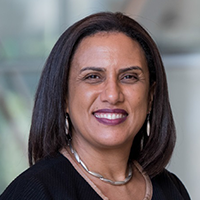
Kirsten Bibbins-Domingo,
PhD, MD, MAS
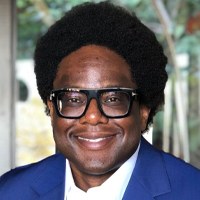
Osagie Obasogie, JD, PhD
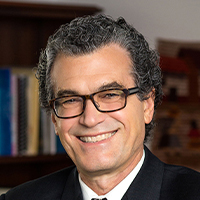
Eliseo J. Pérez-Stable, M.D.
Kirsten Bibbins-Domingo, PhD, MD, MAS
Vice Dean for Population Health and Health Equity
Professor and Chair, Epidemiology and Biostatistics
Lee Goldman, MD Endowed Chair and Professor of Medicine at UCSF
Kirsten Bibbins-Domingo, PhD, MD, MAS is the Professor and Chair of the Department of Epidemiology and Biostatistics, and the Lee Goldman, MD Endowed Chair and Professor of Medicine at the University of California, San Francisco. She is the inaugural Vice Dean for Population Health and Health Equity in the UCSF School of Medicine. She co-founded the UCSF Center for Vulnerable Populations at Zuckerberg San Francisco General Hospital that focuses on actionable research to increase health equity and reduce health disparities in at-risk communities. She is one of the Principal Investigators for the UCSF Clinical and Translational Sciences Institute, and she leads the newly launched UCSF COVID Community Public Health Initiative.
Dr. Bibbins-Domingo is a general internist and cardiovascular epidemiologist whose scholarship includes observational epidemiology, pragmatic trials, and simulation modeling to examine clinical and public health approaches to prevention in the US and globally. She previously served on and led the US Preventive Services Task Force from 2010-2017. She is an inducted member of the American Society for Clinical Investigation, the Association of American Physicians, and the National Academy of Medicine.
Osagie Obasogie, JD, PhD
Haas Distinguished Chair and Professor of Bioethics
University of California, Berkeley
Joint Medical Program
School of Public Health
Osagie K. Obasogie, J.D., Ph.D., is the Haas Distinguished Chair and Professor of Bioethics at the University of California, Berkeley, in the Joint Medical Program and School of Public Health. He is also a Senior Fellow at the Center for Genetics and Society. Obasogie's scholarly interests include Constitutional law, bioethics, sociology of law and medicine, and reproductive and genetic technologies. His writings have spanned both academic and public audiences, with journal articles in venues such as the University of Pennsylvania Law Review (forthcoming), Virginia Law Review (forthcoming), Cornell Law Review, California Law Review, and the Law & Society Review along with commentaries in outlets including The New York Times, The Washington Post, The Atlantic, Slate, the Los Angeles Times, Boston Globe, San Francisco Chronicle, and New Scientist. His first book, Blinded By Sight: Seeing Race Through the Eyes of the Blind (Stanford University Press) was awarded the Herbert Jacob Book Prize by the Law and Society Association. His second book, Beyond Bioethics: Toward a New Biopolitics (University of California Press, co-edited with Marcy Darnovsky), is an anthology that examines the past, present, and future of bioethics. His next book is under contract with Stanford University Press and explores the often overlooked limitations of DNA databases when they are used in criminal investigations. Obasogie received his B.A. in Sociology and Political Science (with distinction in both majors) from Yale University, his J.D. from Columbia Law School where he was a Harlan Fiske Stone Scholar, and his Ph.D. in Sociology from the University of California, Berkeley where he was a fellow with the National Science Foundation.
Eliseo J. Pérez-Stable, M.D.
Director, National Institute on Minority Health and Health Disparities
Eliseo J. Pérez-Stable, M.D. is Director of the National Institutes of Health’s National Institute on Minority Health and Health Disparities (NIMHD), which seeks to advance the science of minority health and health disparities research through research, training, research capacity development, public education, and information dissemination. Dr. Pérez-Stable practiced general internal medicine for 37 years at the University of California, San Francisco (UCSF) before moving to NIH in September 2015. He was professor of medicine at UCSF and chief of the Division of General Internal Medicine for 17 years. His research interests include improving the health of racial and ethnic minorities and underserved populations, advancing patient-centered care, improving cross-cultural communication skills among clinicians, and promoting diversity in the biomedical research workforce. For more than 30 years, Dr. Pérez-Stable led research on Latino smoking cessation and tobacco control policy in the United States and Latin America, addressing clinical and prevention issues in cancer screening, and mentoring over 70 minority investigators. He has published over 300 peer-reviewed articles and was elected to the National Academy of Medicine in 2001.
Panelists
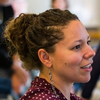
Denise M. Connor, MD

Tung Nguyen, MD

Neeta Thakur, MD, MPH
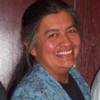
Teresa Villela, MD
Denise M. Connor, MD
Associate Professor, Clinical Medicine, UCSF
Denise M. Connor, MD is an Associate Professor of Clinical Medicine at the University of California, San Francisco (UCSF) and Gold-Headed Cane Endowed Teaching Chair in Internal Medicine with her clinical home in the Faculty Hospital Medicine Division at the SFVA, a vital part of San Francisco’s safety net. Dr. Connor earned her MD at the University of Pennsylvania, came to UCSF for residency, where she took part in the Health Equities: Academics and Advocacy Training Program, and joined the faculty after chief residency. Her scholarly work focuses on designing curricula to teach clinical reasoning with the aims of emphasizing the critical roles of patients, families and interprofessional colleagues in the reasoning process, as well as bringing an equity lens to diagnosis. She designed and leads a longitudinal clinical reasoning thread with a capstone Diagnostic Reasoning course for pre-clerkship medical students, and has developed numerous workshops on clinical reasoning for residents and faculty. Dr. Connor is committed to promoting diversity, equity and inclusion in medical education, and was recently named the first Director of UCSF’s Anti-Oppression Curriculum—she is honored to collaborate with others across campus and in our community to elevate the School of Medicine’s emphasis on justice, equity, and anti-oppression across the entire four-year curriculum.
Tung Nguyen, MD
Stephen J. McPhee, MD Endowed Chair
Professor of Medicine, UCSF
Dr. Nguyen is the Stephen J. McPhee, MD Endowed Chair in General Internal Medicine and Professor of Medicine at UCSF, where he provides primary care to a diverse patient population and teaches students, clinicians, and researchers. He is Director of the Asian American Research Center on Health (ARCH), Co-Leader of the Cancer Control Research Program at the UCSF Helen Diller Family Comprehensive Cancer Center, and Leader of the Integrating Special Populations Core of the UCSF Clinical and Translational Sciences Institute. Dr. Nguyen’s research focuses on achieving health equity using community-based participatory research (CBPR), patient-centered outcomes research (PCOR), and other stakeholder-engaged methods. He has conducted intervention research with diverse populations on cancer and tobacco control, nutrition and physical activity, and end-of-life care. Dr. Nguyen was the UCSF School of Medicine Dean’s Diversity Leader for research diversity in the Differences Matter Initiative.
Neeta Thakur, MD, MPH
Assistant Professor in the Division of Pulmonary and Critical Care Medicine, UCSF
Neeta Thakur, MD MPH is an Assistant Professor in the Division of Pulmonary and Critical Care Medicine at ZSFG and associated faculty in the Center for Vulnerable Populations. Her research program focuses on identifying and addressing multi-level stressors across the lifespan. Her group has linked multiple data types (biologic, individual, and environmental) to demonstrate that social risk factors are geospatially distributed, disproportionately burden communities of color, and are associated with clinically relevant health outcomes, such as asthma and pulmonary function. Dr. Thakur is also Chair of the Health Equality and Diversity Committee for the American Thoracic Society and in this role provides comment on clinical approaches and recommendations as they relate to health disparities.
Teresa Villela, MD
Chief of Family and Community Medicine at San Francisco General Hospital
Professor of Clinical Family and Community Medicine and Vice Chair, UCSF Department of Family and Community Medicine.
Dr. Villela's clinical and educational work has focused on health care of under resourced and vulnerable communities, eliminating health care disparities, chronic illness care, and reproductive justice.
